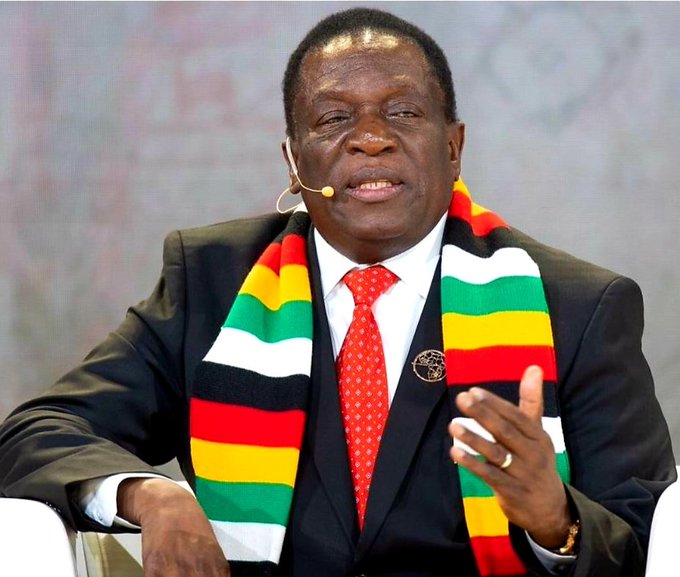
NOVEMBER 17, 2017 marked the end of the late former President Robert Gabriel Mugabe’s reign, who had tormented the people of Zimbabwe since 1980.
The Zimbabwe Defence Forces intervened and made Mugabe’s ruinous reign screech to a halt.
Zimbabwe should not regret that. Mugabe was part of a bigger problem and was supposed to be kicked out.
Mugabe’s ouster was not without drama, but that is food for another day.
Most of us are happy that the old guard that had presided over Zimbabwe’s demise was kicked out.
However, Zimbabweans still await the total departure of a system that Zanu PF created.
All we need is real change, not a smokescreen.
We need new blood in government.
- Chamisa under fire over US$120K donation
- Mavhunga puts DeMbare into Chibuku quarterfinals
- Pension funds bet on Cabora Bassa oilfields
- Councils defy govt fire tender directive
Keep Reading
For now 2023 provides a good opportunity to reboot Zimbabwe.
Those who were shuffled from government to Zanu PF and are enjoying the same perks they used to when they were Cabinet ministers and cannot be trusted with our future.
They should accept that they have run their race and give others a chance.
They failed to inject fresh ideas during their tenure as ministers or Zanu PF bureaucrats, so, what new things can they come up with now?
For us to be in this predicament today is because of Mugabe and his cabal, which includes his successor Emmerson Mnangagwa, Joice Mujuru, Obert Mpofu, Saviour Kasukuwere, Jonathan Moyo, Patrick Chinamasa and Ignatius Chombo, just to mention a few.
We should not relax because Mugabe is gone. We should not be fooled by Kasukuwere that he has reformed.
Just because he was kicked out of the feeding trough, he now wants to act like a reformist. What if he had not been fired from Zanu PF and government?
For the good of the country, all Zanu PF chefs must go and this is what we should ensure as a nation next year.
We cannot keep on being led by very old, greedy and corrupt people.
Furthermore, we will not forget the US$15 billion diamond revenue which has not accounted and was stolen from Chiadzwa.
Ultimately, Zanu PF must go.-Muzokomba villager
High time Zim abolish whipping system THE whipping system is not gagging Members of Parliament only, even outside the august House the general membership is whipped into line.Zimbabweans have adopted a system of hero-worshiping senior party officials to the extent where heaping praises on leaders is viewed as the only way to show one’s loyalty.
I cannot think of a single incident where a top Citizens Coalition for Change (CCC) or Zanu PF member criticised or questioned decisions made by Nelson Chamisa or Emmerson Mnangagwa respectively and was not labelled a sellout.
It seems these two protagonists have become demigods.
One is bashed left, right and centre if they dare to criticised these two politicians.
Are they immune to criticism?
To err is human so they should be corrected.
Unless and until our leaders embrace criticism and are accountable for their decisions, we will never get the best out of them.
Whatever Chamisa or Mnangagwa does is right and unquestionable to their respective supporters.
As result, our leaders are not under any pressure to up their game.
That is why we hear phrases such as “ED pfee” not Zanu PF or Chamisa chete chete not CCC.
Leaders of these political parties have become demigods to their supporters — untouchables.
Anyone who hero-worships their leader is guaranteed a place in the first 11.
In the ruling party, unlimited access to the gravy train is guaranteed, but this is to the detriment of development.
Those who bootlick Mnangagwa are guaranteed of appointment to parastatal boards or Chapter 12 commissioners
Until such a time whipping is discarded, Zimbabwe will not get the best out of parliamentary debates and development will always elude the country.-Chief Chiduku
Africa must prevent collapse of energy sectorENERGY companies are critical to the economy because they invest a lot of capital, provide critical economic services, and employ a significant number of people.
This sector is considered too big to fail and poses a significant systemic risk to African economies. These economies are primarily involved in primary and secondary production and rely heavily on the energy sector.
A typical example is Kenya, which is not a profound oil producer, but most sectors rely on oil for energy.
About a third of the energy mix is accounted for by fossil fuels, and thus any country’s growth prospects will fall along the same lines. A substantial shock to the energy industry will result in the collapse of the economy.
In the business environment, three key influential elements: legal, social and political aspects have to be considered. Mergers bring rejuvenation to under-performing companies in most instances.
The aftermath of mergers involves related social settlements such as massive job cuts that may occur due to streamlined activities.
For energy firms to benefit from economies of scale, digitising processes will be vital in reducing operational costs. This downside to mergers is a significant concern as they continuously increase while the continent continues to record higher unemployment rates.
However, the negative impacts of mergers in the energy sector also affect the respective parties in the deal.
These may include financial partners, shareholders, and even regulatory authorities. Post-transaction litigation risks are common, and these arise when there are legal breaches by the parties involved or their stakeholders. Most of the energy sector investors are from prosperous developed economies and as such protectionism policies may come into play.
Other typical litigation risks include environmental policy breaches in relation to resource over-exploitation as well as excessive pollution.
The result for most of these litigations is incurring unplanned high legal fees and extremes such as the business being forced to close after infrastructure had been established.
As mergers and acquisitions are increasing in Africa, a cautious approach has to be taken by the respective governments.
Protection of national sovereignty, sustainable exploitation of resources and a balance between the capital and social motives by the corporate players.
Having considered a balanced view of mergers in Africa, mergers can help overcome some of the energy sector’s structural issues. The continent needs more capital injection to realise its Agenda 2063.–Further Africa











